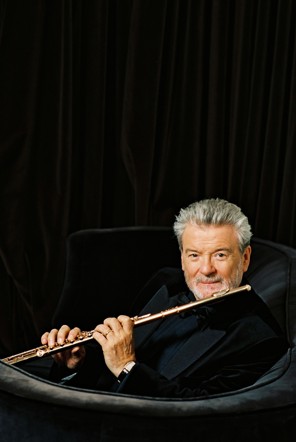By Stephen Brookes • The Washington Post • March 18, 2013
It was Washington’s good luck to have Sir James Galway in town for St. Patrick’s Day, when the renowned Irish flutist appeared at the Kennedy Center for a light but hugely entertaining concert of (mostly) Irish-themed music. From traditional folk tunes to a cheerful little jig for pennywhistle by (of all people) Henry Mancini, Galway played the charmer throughout the two-hour show, telling stories, sharing the stage with his flutist wife and a host of fine young accompanists, and displaying the astonishing virtuosity and vibrant tone that even now, at 73, he shows little sign of losing. The afternoon was billed as Galway’s “Legacy Tour,” and given his rather robust self-regard (on his Web site, he calls himself “the supreme interpreter of the classical flute repertoire” and — oh, dear — “a legend”) you might have expected a program of important masterworks. But “legacy,” he explained, referred to music he had cherished all his life, works with a personal and even sentimental value.
The afternoon was billed as Galway’s “Legacy Tour,” and given his rather robust self-regard (on his Web site, he calls himself “the supreme interpreter of the classical flute repertoire” and — oh, dear — “a legend”) you might have expected a program of important masterworks. But “legacy,” he explained, referred to music he had cherished all his life, works with a personal and even sentimental value.
There was some early Mozart (the lovely Quartet for Flute and Strings No. 1 in D, K. 285, given a spirited and affectionate reading) and a couple of splashy show-off pieces (including Francois Borne’s “Fantaisie Brillante [On Themes from Georges Bizet’s Carmen]”) that he tossed off with wit and almost casual virtuosity. Debussy’s ephemeral “Clair de Lune” was the only clunker of the concert — an oddly earthbound reading so sodden with vibrato it felt like a heap of wet laundry — but it was quickly redeemed by a pair of light-as-air dances from the baroque composers Marin Marais and Francois-Joseph Gossec.
The real heart of the afternoon, though, was in its second half, when Galway began to explore, in a personal and authentic way, his Irish roots. The centerpiece was a fantasy titled “In Ireland” by the early-20th-century composer Hamilton Harty, and Galway seemed to come completely into his own as he played this ravishing work — a genuinely heartfelt performance that alone was worth the price of admission.
A few Irish folk songs followed, including the poignant “She Moved Through the Fair,” before Galway moved back to lighter ground with the lively “Irlandaise” (from Claude Bolling’s “Suite for Flute and Jazz Piano”) and a pair of charming, Irish-flavored works by Henry Mancini — with Galway drawing the audience in for a raucous, full-throated reading of “Baby Elephant Walk.”